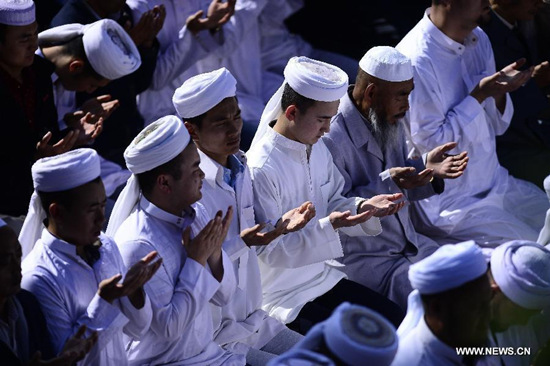
Muslims pray for celebrating the Eid al-Fitr which marks the end of Ramadan at Dongguan Mosque in Xining, capital of northwest China's Qinghai Province, July 17, 2015. (Xinhua/Zhang Hongxiang)
Thousands of Muslims went to Niujie Mosque in downtown Beijing on Friday afternoon. Tens of thousands more will come on Saturday when Eid al-Fitr formally falls in the capital, said Chang Chongyu, head of the mosque administration office.
In Ningxia, where most of the Hui minority lives, a five-day holiday will begin on Saturday. Highways and most scenic spots will be free of charge during the holiday.
"I will have a family get-together in the first two days and spend the other days sightseeing with my kids," said Yang Li, who works in a government department in the regional capital of Yinchuan.
CHANGES in CELEBRATIONS
For Ma Jinliang, a cycling enthusiast in Ningxia, this year's end of Ramadan is quite special.
"It is remarkable that the final of the 14th Tour of Qinghai Lake Cycling Race coincides with Eid al-Fitr, which falls on Saturday in Ningxia," said Ma, who will watch the race in Zhongwei City.
The 2,940-km race, the top cycling competition in China with a total prize of 1 million U.S. dollars, traverses Qinghai, Gansu and Ningxia, where the majority of China's Muslims live. It will end on Saturday in Yinchuan.
"Feeding ourselves is not a problem for us any more," said Ma, who cycles in the suburbs every weekend. "We focus more on improving quality of life with more people joining sports clubs or going to the gym."
Ye Jianguo, 80, a villager from Maying Township in neighboring Qinghai Province, is impressed by the changes to the Eid al-Fitr celebrations in recent years.
"Before 1980, most of us were struggling in poverty," said Ye, who had to cut a piece of brick tea into four parts in order to present them as gifts when visiting relatives and friends.
In the 1980s, Ye only need to cut the tea into two parts as crop output improved. In the 1990s, families not only had enough brick tea, but also could afford to buy tea with crystal sugar and longan, he said.
For this year's celebration, Ye bought a sheep, eight chickens, 25 kg of oil to cook fried snacks and a full table of milk and drinks.
"Five bags of flour are consumed in my shop every day and I have a daily net profit of more than 300 yuan (49 U.S. dollars)," said Ye, who runs a bread shop in the town.
In Kashgar, the westernmost city of China where sporadic terrorist attacks have dampened tourism, Memtimin Haji hopes for more visitors.
After attending Jumu'ah prayers at the Etgal Mosque on Friday afternoon, he rushed back to his souvenir shop close by.
"Business is a bit better on Friday when people gather at the mosque for prayers," he said
















































